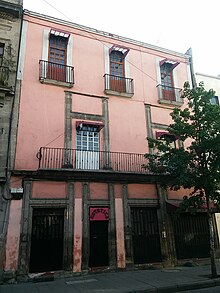Teatro Ulises

The Teatro Ulises (literally Odysseus theater) was an experimental theater, located in the calle de Mesones 42 of Mexico City, that was established around 1927[1]/1928[2] by Antonieta Rivas Mercado, daughter of the architect Antonio Rivas Mercado, and further members of the group Los Contemporáneos. The small theater with about 50 seats[3] only existed for a few months until 1929, but influenced modern Mexican theater fundamentally.[4]
The theater was predominantly created and financed by Antonieta Rivas Mercado and María Luisa "Malú" Cabrera, later Maria Luisa Block,[5] daughter of the writer and politician Luis Cabrera Lobato.[1]
The scenarios were based mainly on translations of scripts of notable international writers, like Jean Cocteau, Eugene O'Neill, Lord Dunsany, Claude Roger-Marx, Luigi Pirandello, Jean Giraudoux, Henrik Ibsen, August Strindberg, Charles Vildrac, Henri-René Lenormand and others.
Notable members of the Teatro Ulises were Salvador Novo, Xavier Villaurrutia, Gilberto Owen, Julio Jiménez Rueda, Roberto Montenegro, Manuel Rodríguez Lozano, Julio Castellanos, Bernardo Ortiz de Montellano, Isabela Corona, Clementina Otero and Celestino Gorostiza.[1][2][6] The building of the former theater gave way to a shopping center.[7]
In 1932 the Teatro Orientación was founded by members of the Teatro Ulises, that followed a similar line, and existed until 1938.
References
[edit]- ^ a b c Manuel Rodríguez Lozano[usurped] (Spanish)
- ^ a b Daniel Vázquez Touriño: El teatro mexicano del siglo XX: búsqueda de la esencia de una nación Archived 2009-07-01 at the Wayback Machine (Spanish)
- ^ Lilia Peralta: Antonieta Rivas Mercado (1900-1931) (Spanish), October 20, 2008.
- ^ Salvador Novo, Michael Alderson: The war of the fatties and other stories from Aztec history, p. 18.
- ^ Maria Luisa Block
- ^ Teatro Ulises (1928) - Celestino Gorostiza (1904-1967), in Lateinamerikanisches Theater Archived 2012-03-26 at the Wayback Machine (German), University of Graz.
- ^ El Teatro Ulises cumpliría 80 años. Fue el foro de los Contemporáneos Archived 2011-07-22 at the Wayback Machine (Spanish), Canal 22
